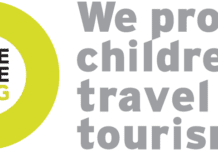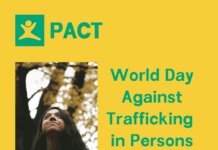 Human trafficking is a seldom-spoken-of byproduct of large gatherings of people — including at meetings and events. Here’s how you can help stop it.
Human trafficking is a seldom-spoken-of byproduct of large gatherings of people — including at meetings and events. Here’s how you can help stop it.
Human trafficking — the recruitment, transfer, harboring or receipt of people by force, fraud or deception to exploit them for profit — engulfs up to 50 million souls globally. While adults and children of all ages and genders can be subject to human trafficking, children now number one third of all victims — and half of all children in forced labor are in commercial and sexual exploitation, according to End Child Prostitution and Trafficking (ECPAT), a global network of civil society organizations that works to end the sexual exploitation of children (The U.S. member of ECPAT, founded in 1991, is PACT).
Because sex trafficking tends to follow the money, large gatherings of people with money to spend — such as meetings and events — are prime magnets. Because Tuesday, July 30, is the 10th World Day Against Trafficking in Persons, this is a good time to check to ensure you and your organization are doing all you can to be a part of the solution.
Could Our Meeting Really Be Involved in This?
While huge public events such as the Super Bowl have been linked to surges in sex trafficking, “It’s not the Super Bowl that creates a spike in trafficking or that trafficking is directly linked to these events. Men who are women buyers and come to a new city for an event or a conference, the chances of them buying sex in that city are pretty high. So, it’s not the Super Bowl … that creates trafficking. It’s the people who already are buying sex and they come here and they buy sex here,” Samantha Calvin, an instructor in Arizona State University’s Edson College of Nursing and Health Innovation, told ASU News in 2023, when the Super Bowl was held at that school’s State Farm Stadium.
It should no longer be surprising that any meeting or event could inadvertently end up supporting human sex trafficking — and airlines attendees travel on and hotels where meetings are held also are prime conduits for sex traffickers.
That’s why a collective of determined conference/event planners, hoteliers and AV professionals formed Meeting Professionals Against Human Trafficking (MPAHT) in 2017 — to raise awareness and provide education on how this industry specifically can work to eradicate human trafficking.
According to Mahima Tripathi, an MPAHT board member and Owner of the Saleint Marketing Agency, Ottawa Tourism announced its commitment to disrupt human trafficking in February, including developing a toolkit for DMOs. She also encourages industry professionals to check out MPAHT’s resources page, which includes relevant information for the meetings, tourism and travel industries. Another resource Tripathi recommends for those in the hospitality sector is a toolkit developed in partnership between Canadian provincial hotel associations, the Hotel Association of Canada, and Not in My City. MPAHT also will be launching two new initiatives, she said, so stay tuned for more on those.
5 Steps to Take Now to Help Stop Human Trafficking at Events
Here are five things you can do now to help stop the scourge of human sex trafficking:
- Sign The Code of Conduct for the Protection of Children from Sexual Exploitation in Travel and Tourism. Generally referred to as The Code, this multi-stakeholder initiative is designed to provide awareness, tools and support to the travel and tourism industry to help prevent the sexual exploitation of children. When you sign on, you agree to follow The Code’s six criteria, which include establishing policies against the sexual exploitation of children; training employees in detection, prevention and reporting; and reporting annually on how you’re implementing The Code. Current signers include hotel chains like Accor, Caesars Entertainment, Choice Hotels, Hilton, Hyatt, Iberostar, IHG, Marriott, MGM and Wyndham; airlines including American and Delta; and meetings and events industries and organizations including BCD Travel, CWT, IMEX, Maritz Travel, Meeting Professionals International (MPI), Society for Incentive Travel Excellence (SITE) and The DMC Network. (Full listing of current members is here.)
- include a clause in contracts that you have a zero-tolerance policy on this issue. While this is one of The Code’s six criteria, you don’t have to sign it to include this clause in your contracts with hotels and other vendors. Another suggestion to consider is requiring the hotels and other vendors you use to have their employees undergo human trafficking awareness training. Tripathi said that MPAHT encourages meeting professionals to include a question about human trafficking on the requests for proposal (RFPs).
- Know how to spot the signs of human sex trafficking. While formal training is ideal, at a minimum ensure your staff know what the signs are, such as travelers who don’t have ID or much luggage, pay cash and appear to be under another person’s control (a full list of signs to look for can be found here.)
- If you see something, say something. If you see the signs, don’t intervene directly as that could put you in danger. Instead report what you are seeing to an authority. If you are in the U.S. and it looks like an emergency situation, call 911. Otherwise, contact the National Human Trafficking Hotline at (888) 373-7888, text the hotline at 233733, or report online to org/chat.
- Include human sex trafficking on your agenda. This scourge hits all industries in some way — educate your audience on the problem by including some sessions on the agenda. You also can ask your local convention and visitors bureau to put you in touch with organizations that help the victims of human sex trafficking to see how you might be able to incorporate a corporate social responsibility (CSR) activity to support their efforts. Checkout MPI’s Anti-Human Trafficking Training Meeting Guide for more ideas on how to raise awareness at your meeting.
You May Also Be Interested In…
Be On the Lookout for Human Trafficking
Human Trafficking Focus of AHLA’s New Advisory Council
Hotels Play a Key Role in Human Trafficking










